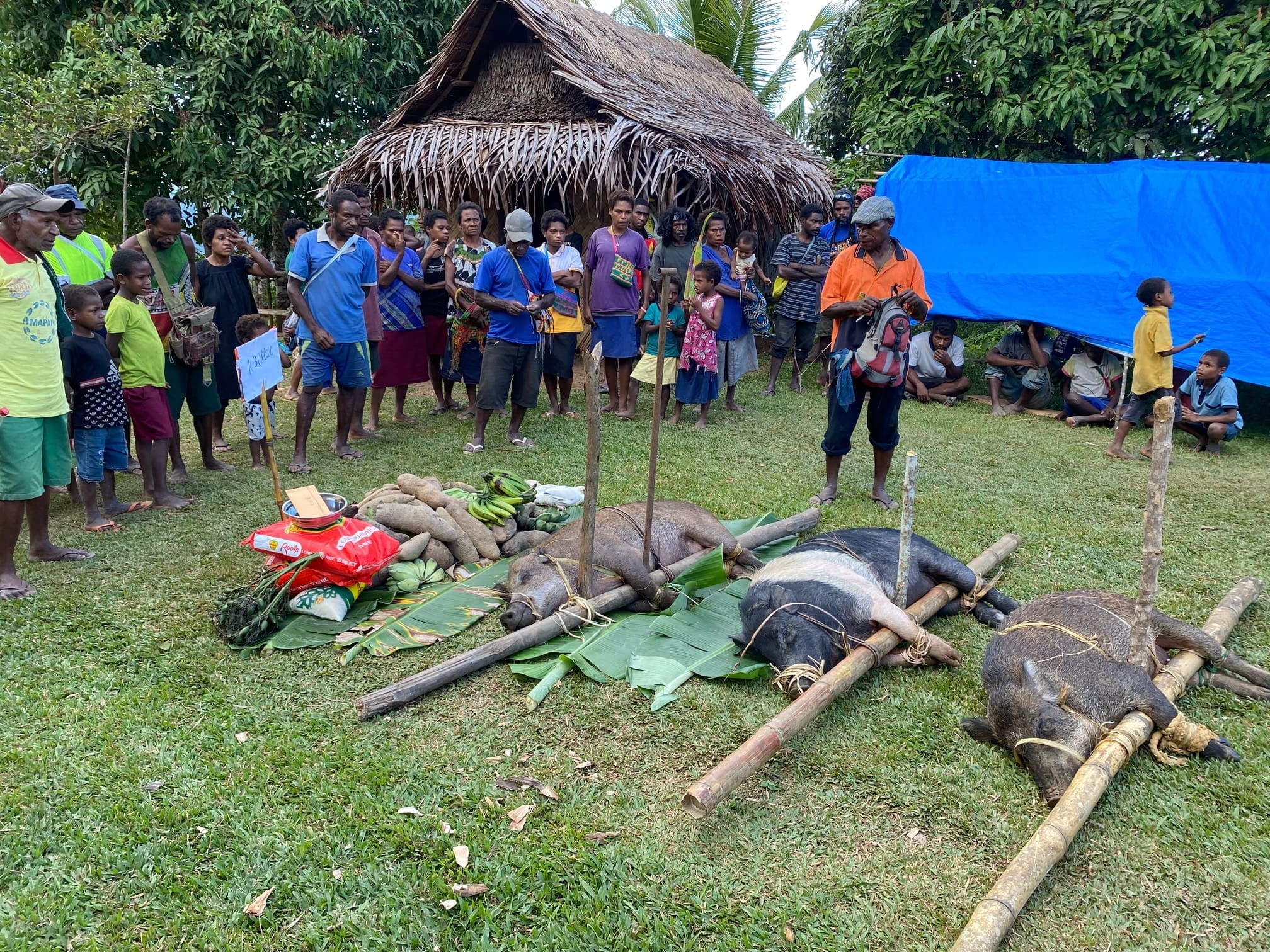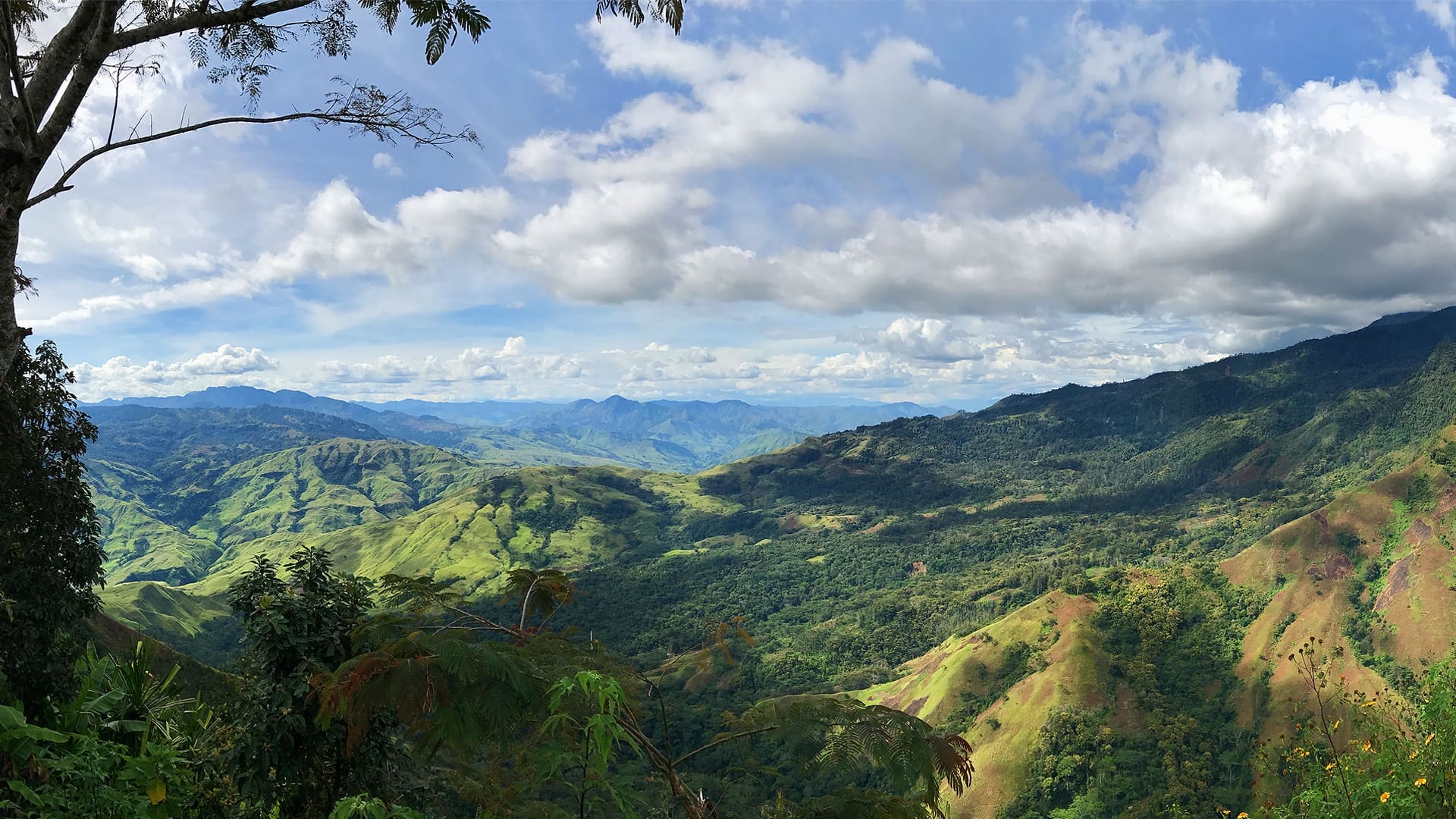O
“One of the pigs died,” I heard someone call out to me in the night.
The day before, the men of the village explained to me that a bride-price ceremony required living pigs—a dead pig was unacceptable. The villagers had been preparing for a bride-price ceremony for almost a week, and this particular night was the climax. When a Papuan man asks the father of his prospective bride for permission to marry her, the father sets a price the man must pay if he and the bride to be consent to the match. The bride price is the cost of transferring the bride, her labour, and her child-bearing potential to the groom’s clan and will exceed the price the father paid for the bride’s mother. My friend’s bride price was set at three fattened pigs and three thousand kina.
We arrived for a visit in the Papuan village of Igoi of the Sob people just a week before a big man, a man of influence because of his generosity and wisdom, was to pay his bride’s price to her father and her clan. The village spent the entire first week after our arrival preparing during the day and in conversations at night to discuss the progress and the work to be done the next day. The jungle growth encroaching into the village had been beaten back, dirt floors of houses were swept clean, the tall grass on either side of the singular village path was cut and swept away, and a haus sel, a temporary shelter made with canvas and sapling trunks for tent poles, had been constructed to accommodate the hundred or so expected visitors for the ceremony. Days before, a delegation of cousins of the groom had gone out to neighbouring tribes to negotiate the purchase of four fattened pigs. Having succeeded in this days before, now they were dispatched in groups to collect the pigs and carry them back to our village, each pig hogtied to bamboo poles resting on the men’s shoulders. A pig dying in transit could be disastrous for the ceremony. But I also remembered they needed two additional pigs for the groom’s festival after the bride’s family left the village. “No worries” I said to the groom. “We can just use the dead pig for our feast here in Igoi.” The groom looked at me with worry in his eyes. “Maybe,” he replied, “but we will have to discuss it.”

I was sure I knew how this situation would resolve—my friend had one fattened pig of his own, and three of the pigs he bought were still alive. As long as no other pigs died during the night, we still had the three fattened pigs we needed for the bride-price ceremony.
I looked up to savour the unspoiled dark sky while they situated the pigs and settled in for the night discussions. Ursa Major hung low and seemingly upside down. Orion stood on his head—a quiet metaphor for the global South’s valuable perspective. The night sky served as reminder that I was a guest. It would be better to listen than to speak in the hours ahead. When I rejoined the council, the groom and the other big men were seated around the fire. All the familiar smells of our consensus-based society met my nose: the smoulder of the fire, the smoky aroma of hand-rolled tobacco and newspaper cigarettes, and the pungent odor of betel nut with daka and kamban—the blood-red spit here and there in the glow of the fire. Consensus comes about in our village through ritual: now passing a burning stick to light a cigarette while you make your point, now dipping your daka leaves in roasted and ground seashell-powder kamban while an elder speaks. The goal of the council is consensus—nothing else will do. And the quiet rituals of betel nut and cigarettes both pass the time and whet goodwill through sharing. If consensus fails to emerge, the conversation will invariably continue the next night. I sat down, quietly assured that I knew how this conversation would play out through its lengthy cycles of repetition and the way our tribe’s language structure keeps careful track of information by restating the previous point before moving on to new information.
The night sky served as reminder that I was a guest. It would be better to listen than to speak in the hours ahead.
With a cheek full of betel nut, one of the big men said to the bridegroom, “I’ll give you one of my fattened pigs in trade for the dead pig.” Everyone else seemed to understand what this meant, but I was puzzled. Why not use the dead pig to feed our own village after the ceremony? After all, they had set about preserving it on a smoking rack. Something significant and meaningful was lost on me. As a Bible translator, I’m learning to be patient and to lean into such opaque moments. And I still need to learn to slow down, be present, and listen closely.
Accompaniment as Mission
Our work of Bible translation is plodding and meticulous. The complexity of the work requires lengthy commitment and patience. Our family has served in the South Pacific nation of Papua New Guinea for four years; we accepted the Sob language of Madang Province as our primary translation responsibility in 2019. We deeply love Igoi village and the Sob people. Since we became their long-term guests, we have known nothing but kindness and hospitality from them. Even so, this particular visit to the village had started with some inconveniences. We were scheduled to be in the village for a month, but on arrival, we discovered our clean-water access had broken down beyond what we could repair with the supplies on hand. We were a bit short on gas for our cooking stove, and I wasn’t sure that we had enough food to last. There was palpable tension about the upcoming bride-price ceremony from the moment we arrived. And the days had been hotter than usual. Our mountaintop village is about 550 metres above sea level. Malaria is endemic, though not as oppressively common as in the sea-level coastal swamps. As a father of small children, all these factors were swirling in my mind, and I was anxiously calculating the sustainability of our visit. We stayed healthy and we got plenty of work done, but the result of these anxieties was that in the back of my mind, I was counting down to our departure. I knew exactly how many days remained in our village visit before we could return to the highlands mission centre.
Our village visits are treasured time, and as surreal as they are precious. North America and all its convenience, bright lights, and hurry never feels further away than when we visit Igoi. The village is often quieter in the heat of the day than in the middle of the dark nights. The afternoons are simply too hot to do anything but rest, so a stillness usually settles on the village after lunchtime. During one afternoon rest, the distant Ramu River valley was full of hazy smoke from countless slash-and-burn sites in the rainforest surrounding us. My eyes traced the worn paths through the jungles as my mind turned over Sob words and how many days until we would have running water and electricity again.
Then, in my sweaty stupor, I had a mystical encounter with Holiness himself, and my needless worry about time fell out of focus. I sensed an invitation from the Lord to consider how ancient these paths were. The path to Dunaba village—how old is it? How many generations of Sob people have come and gone, barefoot, on this mountain path? The rainforest surrounding me had stood as silent witness to every millennium of earth’s history. How many centuries have processed—dry season and wet season, planting and harvesting—as the Sob have gone about their daily rituals? My invitation from the Lord to consider how ancient were these mountains evolved into a more immediate one: an invitation to stop counting days, to be fully present until time’s procession brought our transport back to us. To be present in the moment is the Sob way. It is also the Lord’s way.
The Lord himself appears in Scripture as a man with time to pray, a man with artfully crafted parables no frenetic mind could devise, and a man with time to give to women, to children, to talking around a campfire. How many moments of his life on earth were less than miraculous, not recounted by the Gospel writers? The cheeky ending to John’s account suggests many such moments. The Lord spent thirty-three years on earth, but only three of these were in public life. How many days did he spend as an obscure man from Nazareth, passing the heat of the day napping, before resuming the work of his hands? My own mental countdown, my eagerness to escape our vulnerability and speed up time, my distracted worrying, seemed such a fretful juxtaposition to Jesus’s life.
Accompaniment—walking together in common vocation—as a pastoral concept has been a gift to me in our work. It stands in opposition to my presumption, hurry, and anxiety.
Rather than thinking about our work as an imposition in a faraway land, a limited-time offer of linguistic savvy to a minority language, or as some corrective to a misguided culture, we conceive of our work as an accompaniment—an unhurried walking together toward a common goal. We accompany people on a journey of their choosing toward vernacular Scriptures and a maturing local church using these Scriptures.
The work of Bible translation cannot be done quickly any more than discipleship and spiritual formation in North America can take the pace of fast-food delivery. Accompaniment means experiencing life together at a human-scaled pace. Accompaniment means sharing meals together, staying for the whole discussion until consensus emerges, witnessing bride-price ceremonies, and risking malaria for the sake of being present in the spaces where mosquitos and human life coexist. Our mission organization values time spent in the village. We prize the time we spend in Igoi, accompanying people through the routines of daily life, the moments of laughter and tragedy. Accompaniment is strong medicine against my own anxiety: My own self-doubt and calculations about our capacity for ministry are eclipsed by the conviction that the work is the Lord’s and the Sob people themselves are capable of Bible translation even when I’m preoccupied about time, water supply, or malaria. Accompaniment as a pastoral term works well for decolonized mission. We take up residence in Igoi only by invitation, and we accompany the Sob to a vernacular Bible translation because they asked for it—because they desire the long work of turning the Scriptures into Sob words, Sob clauses, Sob stories.
Accompaniment forbids departure countdowns. The various scenes of table fellowship from Luke’s Gospel portray Jesus as antithetical to hurry. Our most treasured friends are the ones who have time for us, the ones who listen without checking their watches or phones to see what time it is. This is what Jesus is like. He sits at our table and reminds us to savour the moment. He doesn’t walk away while the village elder rolls another cigarette. He walks the whole road to Emmaus with us. He has no countdown, no thought of escaping to the serenity and invulnerability of his heavenly throne. Jesus simply knows how to be present. The feeling of insular safety implied in a departure countdown is exposed as fraudulent in the light of true accompaniment.
Accompaniment and Reconciliation
The afternoon of the bride-price ceremony finally arrived. The whole clan of the bridegroom was gathered around the bridegroom’s house, and in the mid-afternoon, the bride’s clan arrived. After the middle ground separating the respective clans was crimson with spat betel nut remains, the bridegroom’s cousin stood in the middle of the two clans. He presented the bride’s family with more betel nut and announced that it was time for the ceremony to begin. The three fattest pigs were brought forth with heaps of yams, taro, bananas, three thousand kina, and twenty-five kilograms of rice. “With these pigs, the bride is now part of our clan and our place. Let everyone here be witnesses. Take your bride price and go celebrate together,” he said.
As the last of the bride’s clan disappeared over the ancient hills with their three fattened and condemned pigs, four smaller pigs were brought forth. Among their number was the small pig that had died the night before and been traded for a fattened pig. “And now, one last thing before the work is done,” the man in the middle proclaimed to the groom’s clan. “These pigs are given to end the conflict between two houses.” Two couples came forth from opposite sides of the clan gathering, they shook hands with kina tucked in their palms to exchange, spoke their apologies for past wrongs, and traded the pigs. “And now, let us all be witnesses that the conflict between these families is over. There is peace again,” exhorted the man in the middle.
The mood was suddenly lighter, and the women began cooking the massive piles of garden food while the men set about butchering the groom’s pigs. The bridegroom, who by custom had been silent all day, was full of laughter as he walked around greeting everyone. After he greeted me, I asked him, “What just happened? I thought the dead pig was going to be for our village to eat?” He said, “I told you we needed to talk about the pigs. We had to use the fattest pigs for the bride price so we didn’t dishonour the bride. But since the clans were gathered, it was also a good time for having a peace ceremony. The small pigs were just the right size for making peace. That’s why he was happy to trade me his fattened pig for the small one that died.”
He moved on to greet others, and I stood speechless as I realized my presumption. In my hurry the night before to get through what seemed like a conversation about a foregone conclusion, I assumed I knew the logical outcome of the situation. A pearl of great price lay hidden by my impatience for the conversation about a dead pig. The people of Igoi accompanied me patiently through my hurry and presumption, and they crowned a day to celebrate a bride with another treasure still. On top of the joy of a marriage feast, they shared the joy of reconciliation.






